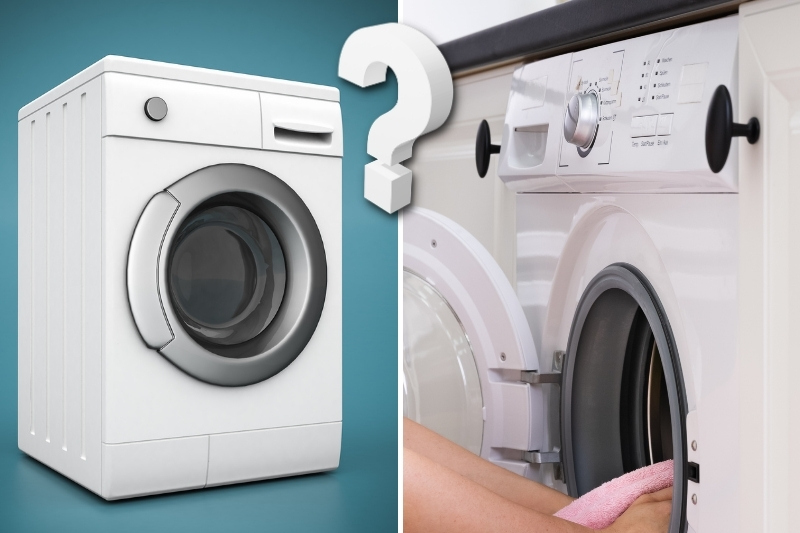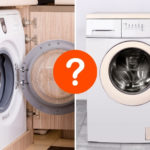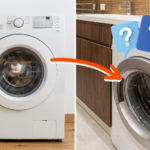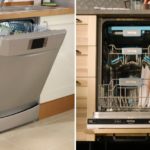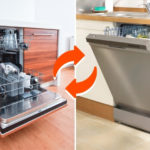When buying a new washing machine, there is much debate about whether an integrated or freestanding washing machine is better.
Each type has pros and cons, so the machine best suited for you will depend on your requirements rather than the effectiveness of the washer itself.
Many factors need to be taken into account when investing in a washer, such as your budget, space to store the appliance, and how much laundry you need to do. Unfortunately, this makes it very tricky to decide which machine to choose.
In this article, you will find a rundown of both types of washing machines so that you can make an informed decision regarding a new purchase.
Freestanding Washing Machines
Freestanding washing machines are the most common type of washer that you will find in people’s homes. Because of this, there is plenty of choice when shopping for a new machine.
You can find freestanding machines at various price points and with different features available to suit anyone’s needs.
The main drawback of having a freestanding washing machine is that they can spoil the look of your home compared to integrated machines, which are hidden behind a cupboard door.
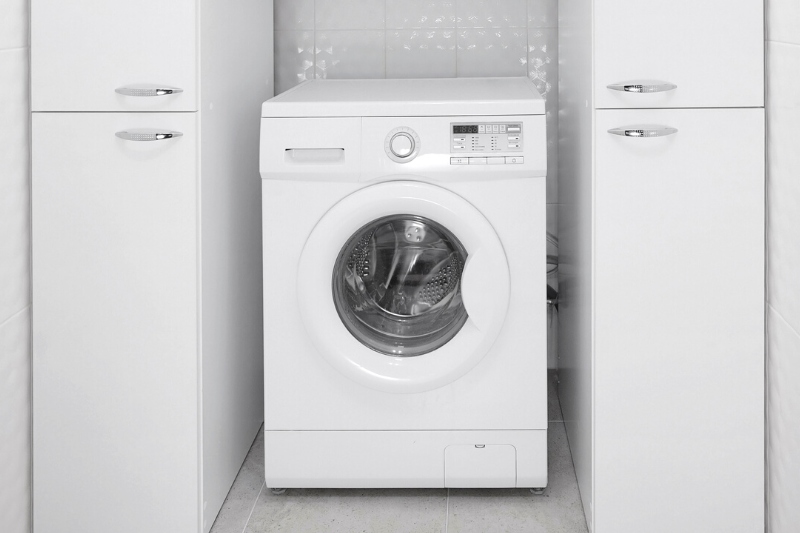
However, the fact that they’re not integrated means they can be placed anywhere in your home as long as there is a water supply, drain, and electrical socket nearby.
It is also possible to hide a freestanding washing machine in a cupboard, but due to its size, this cupboard typically needs to be bespoke made.
While this can be worth the extra time and effort during installation, it will add to the costs of your washing machine, especially if you need to hire a professional to construct the cupboard for you.
Advantages
- Plenty of budget machines on the market
- Lots of choice in machine size and functions
- Easy to install and replace (if needed)
- Can go anywhere in your home and be moved easily
- Possible to conceal it in a cupboard
- Less likely to develop mould and smells, as you can leave the door open
Disadvantages
- Will typically stick out from between cupboards
- Could spoil the look of your home
- A bespoke cupboard is usually needed to conceal it
- Can be quite loud
Integrated Washing Machines
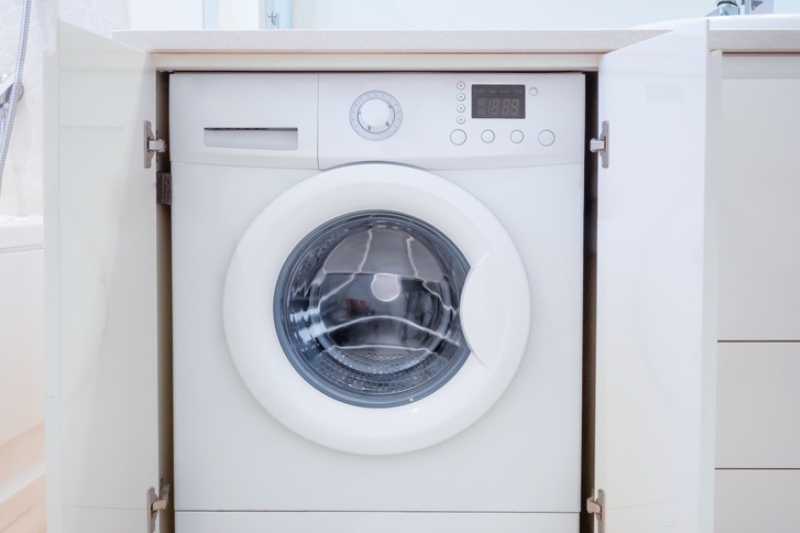
The other main type of washing machine you can buy is an integrated machine. These washing machines have a cupboard door attached to the front that fits in seamlessly with the rest of the cupboards in your home.
This completely hides the washer from view and helps to muffle the sounds of the moving drum during use.
Because these appliances are designed to fit in a cupboard, they tend to be slightly smaller than their freestanding counterparts.
However, this means that the drum usually holds less—integrated machines rarely come with a capacity greater than 9 kg, whereas you can buy freestanding machines with capacities of up to 12 kg. This means you may find yourself doing more loads of laundry than before with an integrated machine.
Another main downside of an integrated washing machine are that there aren’t many models available (for example, Hotpoint currently has 60 options for freestanding washers but only three options for integrated ones!).
Integrated machines also typically have fewer special functions compared to freestanding machines, and they will have to be fitted by a professional.
Advantages
- Won’t ruin the aesthetic of your home
- Doesn’t stick out between cupboards
- Ideal for smaller spaces
- Fairly quiet during use
Disadvantages
- Fewer budget models available
- Limited by choice of machine and functions
- Usually holds smaller loads of washing
- Will need to be fitted by an expert
- Tricky to remove without also removing the worktop and surrounding area
- Can’t leave the door open between uses, risking a smelly and mouldy machine
Which Should You Choose?
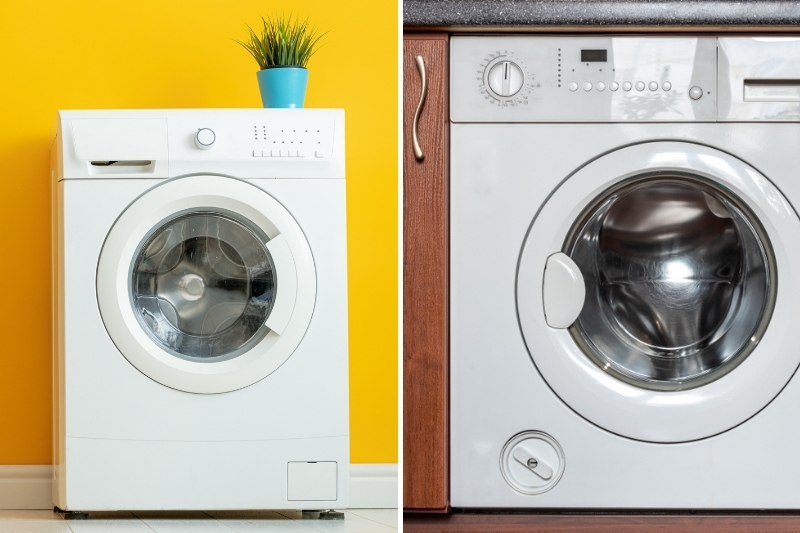
There is no right or wrong answer when choosing an integrated or freestanding washing machine. Both types of machine have their benefits, so you need to base your choice on your particular needs.
The main factors you need to consider include:
- Drum capacity: How much washing do you typically need to do each week? Freestanding washers come with various drum sizes to suit every need, but integrated ones tend to only hold smaller loads.
- Noise level: Every washing machine will have a noise level rating for wash and spin cycles in their product specifications. The higher the number of decibels, the louder the machine will be.
- Energy ratings: Every washing machine will also have an energy rating that tells you how energy-efficient that appliance is. The better the energy rating, the cheaper your new washer will be to run.
- Special functions: As technology progresses, washing machines that come with special features are becoming more common. For example, some washers can be controlled remotely using an app or have specific wash cycles for sensitive skin.
- Budget: How much are you willing to spend on a new washing machine? There are machines out there to suit every budget, but integrated washers or ones with lots of special functions will be more costly.
- Available space: The space you have to store your washer in is a huge factor when buying a new appliance. For example, if you live in a small apartment, you will have to compromise on the size of your washer to be able to fit it in your home.

Hannah has a passion for cleaning. She worked her way around Australia by cleaning hostels in exchange for free accommodation and used her cleaning skills to bag a job as a chalet host for a luxury ski company in France.
